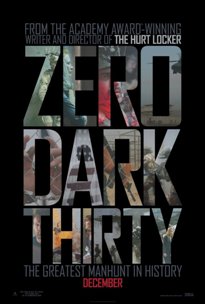
Eventually, of course, Argo walked away with the big prize. Lincoln and Zero Dark Thirty, along with the rest of the other Best Picture nominees, did not. But Lincoln did pick up a major award (Best Actor for Daniel Day-Lewis). Zero Dark Thirty, meanwhile, was shut out (unless you count a throwaway award for Sound Editing that it shared with Skyfall). Of course, Zero Dark Thirty isn’t the first deserving movie to be passed over by the Academy (Raging Bull, Pulp Fiction, and a host of other films come to mind). But for a film as momentous as this one to fail to take home a single major award is a travesty.
I should say that I wouldn’t be so upset about this development if I thought the snubbing of Zero Dark Thirty was based purely on its merits as a work of art. Unfortunately, I don’t believe that to be the case. Since its release, any discussion of Zero Dark Thirty has centered as much on the politics of the movie as on the script or the acting. That, of course, is fine. Great movies should, and often do, inspire that type of discussion. But the unfortunate side effect of this has been that, at some point, Zero Dark Thirty became a movie that endorses terrorism. Never mind that this is akin to saying JFK endorsed presidential assassinations, or that Schindler’s List endorsed the Holocaust.
[springboard type=”video” id=”680061″ player=”cnim002″ width=”560″ height=”315″ ]
Zero Dark Thirty is a movie that presents itself as a fictionalized account of real-life events. Nothing more. Nothing less. I’m not naïve enough to believe that all the events depicted on the screen actually happened exactly as they are portrayed. But I’m also not clueless enough to believe that the United States never engaged in torture during the so-called “War on Terror.” Of course, all that doesn’t matter. Because the important thing to remember is that there is no grand statement or ulterior political motive here. Zero Dark Thirty is just a movie. And it’s a damn good one. One more than deserving of, if not a Best Picture nod, then at the very least a Best Actress award for the incredible Jessica Chastain, or Best Director for Kathryn Bigelow (who, shamefully, wasn’t even nominated).
So what makes Zero Dark Thirty so great? Well, that discussion starts with the unforgettable performance of the aforementioned Chastain as Maya. There are a lot of memorable performances and neat cameos in the film (James Gandolfini, Chris Pratt, and Stephen Dillane among them), but Maya is the only truly meaty role in the film, and if the Maya character didn’t work, the entire movie would fall apart. The themes of Zero Dark Thirty as I see them are obsession, futility, and revenge. Chastain manages to embody all of those aspects in her performance. Her character is tasked with representing an entire nation’s frustrations at a decade-long witch hunt, and the veteran actress does a phenomenal job.
The progression of the Maya character from passionate, brilliant yet somewhat naïve recruit into the haunted and driven specter she becomes at the conclusion of the film is absolutely compelling. Chastain does a masterful job of maintaining a steely composure throughout the film, but the eyes of her often inscrutable Maya tell the whole story. And her final scene, all alone on an airplane, is heartbreaking.
Jessica Chastain in “Zero Dark Thirty.” Photo by Jonathan Olley – © 2012 – Zero Dark Thirty, LLC. All Rights Reserved.
Director Bigelow and screenwriter Mark Boal also deserve praise in tackling this challenging subject matter. Through their efforts, Zero Dark Thirty manages to take some rather scattershot events and create an intriguing narrative that feels significantly fleshed out, but never over-stuffed. This is essentially an epic suspense movie that takes place over the course of a decade. The characters in the film, because of their situation, are constantly at risk, and on edge. And the audience is along for the ride, too, just as shocked when a terrorist bomb explodes or unexpected gunfire erupts in a crowded area. This sense of tension is palpable throughout the film. Everything just feels so real. In fact, the unforgiving, visceral nature of some of the scenes (especially those depicting torture, and the final raid) is probably one reason why some people have had such a negative reaction to Zero Dark Thirty (often overlooking its many merits in the process).
In the end, I don’t know that Zero Dark Thirty deserved an Oscar for Best Picture. After all, Argo is a great movie. But so is this one. It’s a movie that forces us to confront an ugly situation and question both ourselves and those supposedly acting on our behalf. And it’s unfortunate that politics and other factors may have gotten in the way of some people realizing just how great it is. But, then again, maybe it all doesn’t really matter. Twenty years later, nobody cares that a movie like Goodfellas never won Best Picture. It’s still loved and admired just the same. Maybe twenty years from now, when we’re a little more removed from these events and all its negative associations, we can all come to objectively appreciate Zero Dark Thirty for what it actually is: a near-flawless encapsulation of all the noise, terror, fear, and paranoia that followed 9.11 and an excellent depiction of the ongoing struggle to deal with those repercussions.